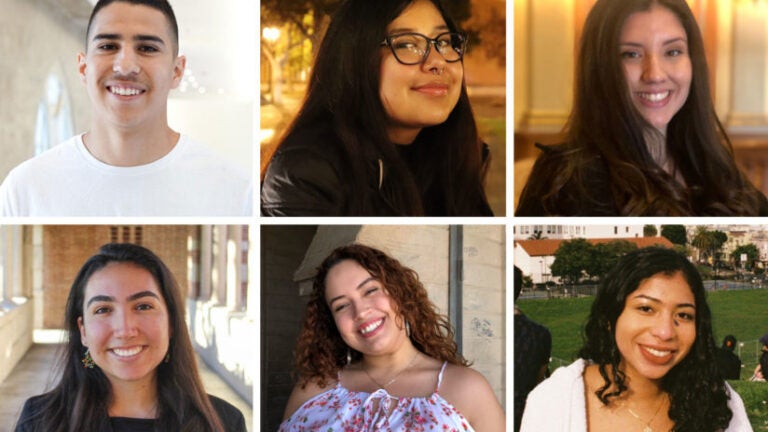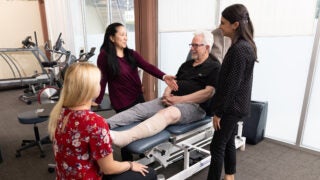
Daniel Flores, Isis Galeno, Alanis Gonzalez, Monique Lennon Gonzalez, Sandra Olmedo and Sofia Reyes, clockwise from top left. (Photos/Courtesy of Daniel Flores, Isis Galeno, Alanis Gonzalez, Monique Lennon Gonzalez, Sandra Olmedo, and Sofia Reyes)
Latinx, Latino/a or Chicano: Students share what they call themselves and why
USC students talk about which labels they prefer, the stories behind them and the significance of self-identifying the way they do.
Latina. Chicana. Mexican American. Latinx. Latine. Afro-Latinx. Whichever term you use, all are examples of the intersectionality of people with Latin American heritage — and those examples merely scratch the surface.
Even as the term Latinx has gained wider acceptance — particularly in academic settings, due to its perception as a gender-neutral and pan-ethnic label — only around a quarter of U.S. adults who self-identify as Hispanic or Latino have even heard of the term.
As the Sept. 15 to Oct. 15 celebration of Latinx Heritage Month — also known as National Hispanic Heritage Month — draws to an end, several USC students talk about the stories behind the labels they prefer and the significance of self-identifying the way they do.
Isis Galeno
Chicana
Major: Anthropology; NGOs and Social Change
Hometown: Los Angeles
A first-generation student from South L.A., Galeno transferred to USC after completing her first semester abroad in France at the American University of Paris and second semester at Santa Monica College. Since transferring to USC, she has participated in several education-based programs and organizations and is currently president of Latinxs Empowering Academic Progression. Galeno has also been a mentor through several university mentorship programs, taught middle school classes through an internship with Wise Readers to Leaders and is an undergraduate researcher for the Boyle Heights Museum.
“I prefer to identify as Chicana because I think it’s a nice way to honor the people that have fought for it to become a term in the first place,” she said. “I like that it has sort of a political meaning to it, as opposed to just using Mexican American, which I can also go by.”
Sandra Olmedo
Latine
Major: Psychology with minors in Spanish and Public Health
Hometown: Los Angeles
Another first-gen college student born and raised in South L.A., Olmedo prides herself in her academic excellence and has been on the dean’s list each semester of her USC career. She credits her community and her own “growth mindset” with pushing her to meet her potential. In addition to academic success, Olmedo has also worked in the nonprofit sector helping diversify private schools in Los Angeles and in the educational field as a teacher’s assistant and a USC orientation advisor.
“I still consider myself Chicana, but I think that Latine is a little bit more accessible and that is why I identify as such,” she said. “Chicana is very specific to Mexican Americans, and sometimes there can be problems with identifying in such a niche area. A problem here in the states is that other Latin American countries that aren’t Mexico get erased in the main culture. Everyone gets asked ‘Are you Mexican?’ before they get asked anything else. So that was a conscious decision on my part to break away from that.”
Alanis Gonzalez
Latina (Mexican/Peruvian)
Program: Master of Social Work
Hometown: Inglewood
A first-gen college student, Gonzalez earned her bachelor’s degree in sociology and Chicanx/Latinx studies from Loyola Marymount University before attending the USC Suzanne Dworak-Peck School of Social Work. As a self-identified “proud Latina” in the final year of her social work program, Gonzalez reflects on how this experience has broadened her love for herself, education and social justice. This school year, she is interning in the Los Angeles Mayor’s Office of Public Safety, influencing, researching and assisting in policy creation. To maintain an active involvement within her Latinx community, she has transitioned to serve as co-chair of the USC Latinx Social Work Caucus, working to create a more inclusive “comunidad” for all students within her program.
“I choose to use Latina as an individual identity, but for the community, I choose to use the term Latinx,” she said. “For Latina, I just feel like it’s something that I’m more comfortable with. I come from Mexican and Peruvian heritage, so there’s a little bit of everything within that.”
Monique Lennon Gonzalez
Afro-Latinx (Salvadoran, Jamaican)
Major: Undecided, planning to go into Sociology
Hometown: San Bruno, Calif.
Lennon is a first-gen Afro-Latinx student with a strong passion for civil and human rights. As someone who believes every person should have access to food, housing, education and healthcare, she recently started a podcast with a friend speaking on these inequalities. She is the social media and recruitment chair for the USC chapter of LaFe — the only Latinx Bible study on campus — and also helps run an Instagram account, Informeta, which uses art as a call for awareness and engagement in societal issues.
“The term Afro-Latinx to me really highlights the intersectionality of my identity, if that makes sense,” she said. “I do identify as Latinx because my mom is from El Salvador, but I’m also Black because my dad is from Jamaica. It can get kind of confusing, and the lines can get blurred. But there are other people that are Afro-Latinx, like Black people that are born in Cuba, who would consider themselves Latinx. So that’s what that term means to me.”
Daniel Flores
Mexican American
Major: Human Biology (on pre-med track)
Hometown: Delano, Calif.
Flores, a senior studying human biology on the pre-med track, said that while his career selection has come with its share of difficulties, his path has also challenged him and made him someone who values compassion, empathy and the building of community. Though by his own admission, his hometown — a small, low-income agricultural town in the Central Valley — might not have had much to offer at face value, it provided a great community for him to grow up in. At USC, Flores tries to implement the values he observed into everything he does, from breast cancer research on campus to elementary school student mentoring in the South L.A. community. While he has made the most out of these opportunities, Flores said his strongest attribute is his persistence to continue supporting the Latinx and other underserved communities.
“The whole topic of what term to use has always kind of confounded me,” he said. “I’ve always had this struggle within to identify with one word that suits me. But I think the Mexican American identity for me definitely stems just from my actual roots, and it’s the identity that I still associate myself with, in terms of my previous generations.”
Sofía Reyes
Latina, Mexican
Major: Health Promotion and Disease Prevention
Hometown: Chula Vista
Reyes’ interests lie in the health care field, where she aspires to be a medical and public health leader for refugee, migrant, asylum-seeking, low-income and housing-insecure communities. A daughter of immigrants, Reyes is now an intern at the California Department of Public Health in the office of Binational Border Health. She hopes to pursue her progressive master’s in public health at USC, with an emphasis in epidemiology. After gaining clinical experience, she aims to attend the USC physician assistant program to later work with international NGOs as a field epidemiologist. Reyes is also a cadet with Air Force ROTC, a Keck School of Medicine of USC student ambassador, a resident assistant, a board member for Latino Students in Medicine and a La CASA Latinx student leader.
“Because I don’t fall under normal categories, I’ve been told a lot of times that I look ‘ambiguous,’” she said. “When I do get that question, the first thing I say is I’m Mexican because that’s where my parents are from. They were born there and immigrated here. And instead of referring to myself as Mexican American, because I guess that’s what I am, I prefer Chicana because of the movement that was born in America.”



